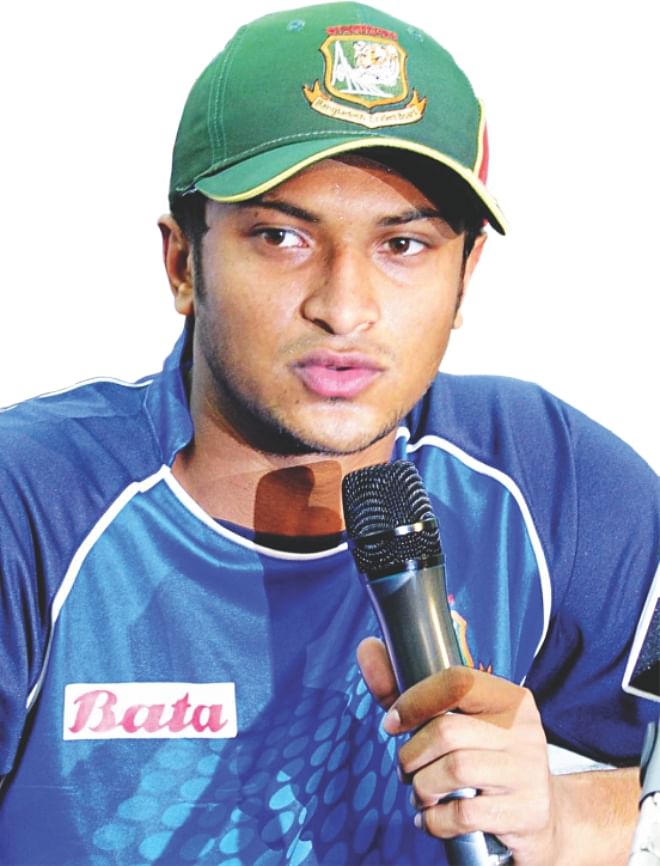Words must be backed by action

When news broke out this week that all-rounder Shakib Al Hasan left to take part in the Caribbean Premier League without obtaining the board's no objection certificate (NOC), there was an air of inevitability around the newsroom, as opposed to the general excitement that follows a Shakib-related controversy.
Having repeatedly made the headlines for the wrong reasons this year the impression was as though that the all-rounder was almost expected to get into trouble again.
His latest move however seems to have crossed a line, with Bangladesh Cricket Board (BCB) president Nazmul Hassan Papon publicly criticising him. Papon's remarks, in which he equated the left-hander's indiscipline to the team's downfall is a first of a kind from a BCB official in his position.
While talk about how the likes of Shakib and a few other senior players tend to dominate proceedings within the team have been floating around for a while, Papon's statement on Friday that he 'won't let the team fall due to the disciplinary problems of two players' and that the team 'requires a surgery' is a clear indication of the president's position against the player.
Another aspect that the president spoke of was the need for stronger management, an aspect which he plans to address in the upcoming board meeting.
Shakib's decision to leave without the NOC was a fault partly shared by the management. The left-hander had initially received verbal approval for his departure from cricket operations chairman Akram Khan; a day later however, he was asked to wait by the CEO, an instruction which the left-hander did not follow.
While the drastic changes are yet to be made, the BCB president deserves accolades for zeroing in on this issue, because these concerns have been haunting Bangladesh cricket for a long time.
Take for instance Shakib's disciplinary record this year alone: making a lewd gesture on live television, insulting the faith of Bangladesh's loyal fan base in an interview during the World T20, leaving the dressing room and entering the stands during an ODI and allegedly getting into a scuffle with an audience member and now, leaving without receiving the NOC.
One can argue that the major factor behind the left-hander's consistent trysts with controversy is the board's inability to handle him. The importance of his performances on the field has almost perennially compelled the board to overlook his disciplinary breaches.
And the policy, as expected, has had its fair share of drawbacks; the most alarming of which is the message it sends to younger national players. That a player has the freedom to do whatever he wants to as long as he performs on the field, as the president put it, has the potential to “destroy' the future of Bangladesh's cricket.
All these problems could have been solved if there was someone to have firm control over the administration, and this is where the role of the CEO comes in. The president himself rightly identified the problems in the management but in order to solve these issues, the board needs the right man wielding executive powers.
The BCB president's statements to the media indicate the first signs of change. That the BCB president is ready to form a team without players who have disciplinary issues is a bold statement and will be a welcome change if implemented.
Of all the controversial activities that Shakib has been a part of this year, it was perhaps his threat to quit Test and ODI cricket -- which Shakib reportedly told coach Chandika Hathurusingha during a discussion -- that best describes the player's current philosophy; it is the sort of attitude that no team in the world should have room for and previous examples around the world have shown that.
Andrew Symonds lost his career due to his drinking problems; Shane Warne was never made captain because of his off-field troubles and Kevin Pietersen was let loose because of his turbulent relationship with the team management.
The question over here though is whether the BCB has the capability and the will to make those much-needed adjustments that an irked Papon has been telling the media about for the last two days, or whether those words will merely remain as mere stories in the media's domain.

 For all latest news, follow The Daily Star's Google News channel.
For all latest news, follow The Daily Star's Google News channel. 



Comments